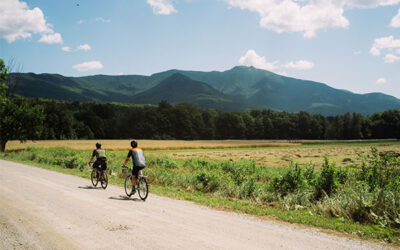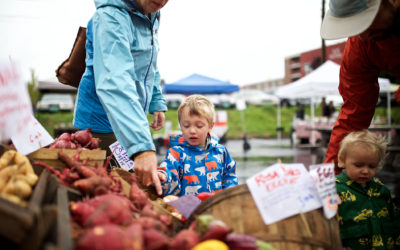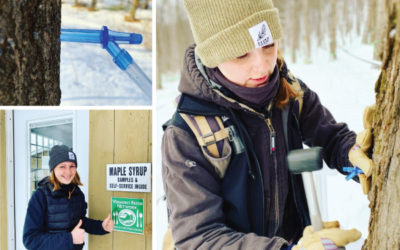Food and Beverage
Agricultural roots, today's palates.61,506
Food system jobs (2023)
690
organic farms in vermont (2024)
400
Establishments hold licenses to sell creemees
14.7
breweries per capita (#1 in u.s.
per 100,000 21+ adults) (2023)
Innovation and interconnectivity from farm to plate.
Vermont is quickly becoming the East Coast epicenter of food and farm entrepreneurship.
Vermont ranks first in the nation for craft breweries per capita and is regularly recognized for its award-winning cheeses from companies like The Cellars at Jasper Hill, Spring Brook Farm, Vermont Creamery, and Cabot Creamery Cooperative. The Alchemist Brewery’s Heady Topper is a widely-sought-after favorite and Hill Farmstead has been named the best brewery in Vermont, the United States, and the world (for the 4th time in a row!) by RateBeer.com.
Vermont food products are in high demand nationally; the state produces 47 percent of the nation’s maple crop — making it the national leader — and 67 percent of all milk in New England. Major regional and national players include AgriMark, Commonwealth Dairy, and Ben & Jerry’s in the dairy industry; and Long Trail Brewing, Woodchuck Cider, and Caledonia Spirits in beverages. King Arthur Baking Co., a 200-year-old, employee-owned company, is the largest producer of bread flour in the country.
Within the food system, producers collaborate, recognizing the value of working together to promote their products, share best practices, and expand Vermont’s reputation for world-class products.
Since the state began implementing its first Farm to Plate Strategic Plan, Vermont has added 6,560 food-system jobs — now totaling almost 65,000 — and increased food-system gross sales by 32% and value-added food manufacturing by 58%. In the past ten years, 10 new inspected meat processing facilities and 151 new dairy processing facilities (both on-and off-farm) came online, fueling continued sustainable growth in the state’s thriving agriculture sector (based on 2019 data).
Vermont attracts students who value farms and food, and there are many talented graduates interested in being part of the local food system. Opportunities abound from short courses and stackable credentials, to a 2-year hands-on technical degree to four-year bachelor degrees and even a food systems masters or law degree. Higher education institutions such as the University of Vermont, Vermont Technical College, Sterling College, Vermont Law School, Middlebury College, and Bennington College keep the talent pipeline full, turning out scores of skilled graduates annually, with programming and certificates in almost two dozen core areas of food systems study.
Interested in the food and beverage industry but don’t know where to start?
Vermont Businesses Are Hiring:
Further Reading
10 Reasons Why Vermont Offers The Ultimate Life/Work Balance
Amid the rolling mountains and stunning landscape of Vermont, you’ll find a vibrant, thriving state that can be 100% ideal for those who want a...
How to Eat Like a Local in Vermont
The bright rainbow of local produce and the smells of ground coffee and fresh-baked bread make diving into local food a delicious experience. From farmers markets to CSAs to growing your own or dining out, here’s how to eat like a local in Vermont.
Meet the Maple Sugarmaker: Baird Farm
Is there anything more Vermont than making maple syrup? We all look forward to those warmer winter days and cold nights because we know the maple...
In Vermont, Food is
Serious Business
From world class restaurants and family owned bakeries to global brand ice cream and beer, Vermont’s food and beverage establishments and manufacturers employ tens of thousands, delivering the bounty of our thriving food system.
- Video 1: Vermont Restaurants Work
- Video 2: Cold Hollow Cider Donuts
- Video 3: Solar Sweet Maple Farm
- Video 4: Cheesemaking at Shelburne Farms
Vermont’s Breweries, Distilleries & Cideries
We Want You to Succeed in Vermont.



